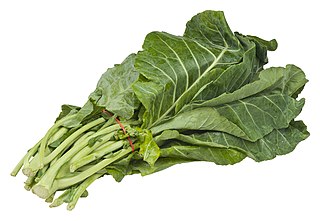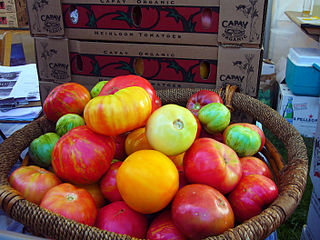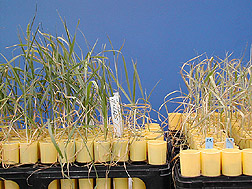
The radish is an edible root vegetable of the family Brassicaceae that was domesticated in Asia prior to Roman times.

Collard refers to certain loose-leafed cultivars of Brassica oleracea, the same species as many common vegetables, including cabbage and broccoli. Collard is a member of the Viridis Group of Brassica oleracea. American collard cultivars are more correctly placed in the Viridis cultivar group due to a high genetic similarity with cabbage, although older publications often include them within the Acephala Group (kale). The name "collard" comes from the word "colewort".

In agriculture and gardening, seed saving is the practice of saving seeds or other reproductive material from vegetables, grain, herbs, and flowers for use from year to year for annuals and nuts, tree fruits, and berries for perennials and trees. This is the traditional way farms and gardens were maintained for the last 12,000 years.

Seed companies produce and sell seeds for flowers, fruits and vegetables to commercial growers and amateur gardeners. The production of seed is a multibillion-dollar business, which uses growing facilities and growing locations worldwide. While most of the seed is produced by large specialist growers, large amounts are also produced by small growers that produce only one to a few crop types. The larger companies supply seed both to commercial resellers and wholesalers. The resellers and wholesalers sell to vegetable and fruit growers, and to companies who package seed into packets and sell them on to the amateur gardener.

An heirloom plant, heirloom variety, heritage fruit, or heirloom vegetable is an old cultivar of a plant used for food that is grown and maintained by gardeners and farmers, particularly in isolated or ethnic minority communities of the Western world. These were commonly grown during earlier periods in human history, but are not used in modern large-scale agriculture.

An heirloom tomato is an open-pollinated, non-hybrid heirloom cultivar of tomato. They are classified as: family heirlooms, commercial heirlooms, mystery heirlooms, or created heirlooms. They usually have a shorter shelf life and are less disease resistant than hybrids. They are grown for a variety of reasons: for food, historical interest, access to wider varieties, and by people who wish to save seeds from year to year, as well as for their taste.
Kent Whealy was an American activist, journalist and philanthropist who co-founded Seed Savers Exchange and promoted organic agriculture and the saving of heirloom seeds. Raised in Wellington, Kansas he was inspired by the works of agricultural geneticists Jack Harlan and H.Garrison Wilkes to use his training in communications to promote the protection of genetic diversity in agriculture.
This is an alphabetical index of articles related to gardening.
Seed Savers Exchange, or SSE, is a non-profit organization based near Decorah, Iowa, that preserves heirloom plant varieties through regeneration, distribution and seed exchange. It is one of the largest nongovernmental seedbanks in the United States. The mission of SSE is to preserve the world’s diverse but endangered garden heritage for future generations by building a network of people committed to collecting, conserving, and sharing heirloom seeds and plants, and educating people about the value of genetic and cultural diversity. Since 1975, Seed Savers has produced an annual yearbook of members’ seed offerings, as well as multiple editions of The Garden Seed Inventory, and The Fruit, Nut and Berry Inventory. SSE also publishes Seed to Seed: Seed Saving and Growing Techniques for Vegetable Gardeners. The nonprofit has sold seeds to about 600 retail stores in the United States and Canada.
Southern Exposure Seed Exchange (SESE) is a cooperatively-owned seed company. SESE is a source for heirloom seeds and other open-pollinated (non-hybrid) seeds with an emphasis on vegetables, flowers, and herbs that grow well in the Mid-Atlantic region. SESE also supports seed saving and traditional seed breeding through their product line, through lectures and workshops, and by working with over 50 small seed-growing farmers in the Mid-Atlantic and other parts of the United States. SESE publishes an intermittent email newsletter and blog for gardeners, as well as the Southern Exposure Seed Exchange Catalog and Garden Guide.

The tomato is the edible berry of the plant Solanum lycopersicum, commonly known as a tomato plant. The species originated in western South America and Central America. The Nahuatl word tomatl gave rise to the Spanish word tomate, from which the English word tomato derived. Its domestication and use as a cultivated food may have originated with the indigenous peoples of Mexico. The Aztecs used tomatoes in their cooking at the time of the Spanish conquest of the Aztec Empire, and after the Spanish encountered the tomato for the first time after their contact with the Aztecs, they brought the plant to Europe. From there, the tomato was introduced to other parts of the European-colonized world during the 16th century.

Intensive crop farming is a modern industrialized form of crop farming. Intensive crop farming's methods include innovation in agricultural machinery, farming methods, genetic engineering technology, techniques for achieving economies of scale in production, the creation of new markets for consumption, patent protection of genetic information, and global trade. These methods are widespread in developed nations.

Seed swaps are events where gardeners meet to exchange seeds. Swapping can be arranged online or by mail, especially when participants are spread out geographically. Swap meet events, where growers meet and exchange their excess seeds in person, are also growing in popularity. In part this is due to increased interest in organic gardening and heritage or heirloom plant varietals. This reflects gardeners' interest in "unusual or particular varieties of flowers and vegetables," according to Kathy Jentz of Washington Gardener Magazine (Maryland).

Pear tomato or teardrop tomato is the common name for any one in a group of indeterminate heirloom tomatoes. There are yellow, orange, and red varieties of this tomato; the yellow variety being most common. They are generally sweet, and are in the shape of a pear, but smaller. They are heirlooms and have 3 common other names, such as the "Red/Orange/Yellow Pear Tomato Plants."

Plant breeding is the science of changing the traits of plants in order to produce desired characteristics. It has been used to improve the quality of nutrition in products for humans and animals. The goals of plant breeding are to produce crop varieties that boast unique and superior traits for a variety of agricultural applications. The most frequently addressed traits are those related to biotic and abiotic stress tolerance, grain or biomass yield, end-use quality characteristics such as taste or the concentrations of specific biological molecules and ease of processing . Plant breeding can be through many different techniques ranging from simply selecting plants with desirable characteristics for propagation, to methods that make use of knowledge of genetics and chromosomes, to more complex molecular techniques. Genes in a plant are what determine what type of qualitative or quantitative traits it will have. Plant breeders strive to create a specific outcome of plants and potentially new plant varieties, and in the course of doing so, narrow down the genetic diversity of that variety to a specific few biotypes.
Mutation breeding, sometimes referred to as "variation breeding", is the process of exposing seeds to chemicals, radiation, or enzymes in order to generate mutants with desirable traits to be bred with other cultivars. Plants created using mutagenesis are sometimes called mutagenic plants or mutagenic seeds.
Seed of Diversity, Semences du patrimoine, is a Canadian charitable organization that aims to "search out, preserve, perpetuate, study, and encourage the cultivation of heirloom and endangered varieties of food crops", particularly Canadian plants, and to educate the public about their use. It has been called "The Canadian NGO leader in two key areas of food system sustainability: crop genetic diversity and the redesign of pollination strategies".
The Open Source Seed Initiative (OSSI) is an organization that developed and maintains a mechanism through which plant breeders can designate the new crop varieties they have bred as open source. This mechanism is advanced as an alternative to patent-protected seeds sold by large agriculture companies such as Monsanto or DuPont. OSSI is a U.S. based not-for-profit 501(c)(3) organization focusing on establishing a protected commons of open source varieties and on educational and outreach activities associated with the development of this open source seed commons and on seed rights and issues related to the control of seed.
Siberian tomato is a variety of the common tomato plant. It is called "Siberian" because it is capable of setting fruit at 38 degrees Fahrenheit, although it is not particularly frost hardy, despite its name.










